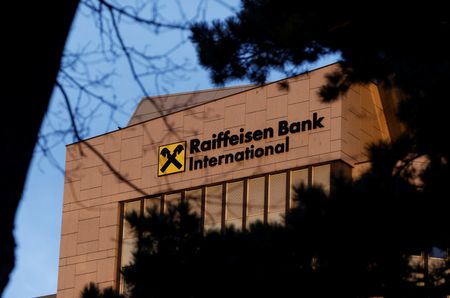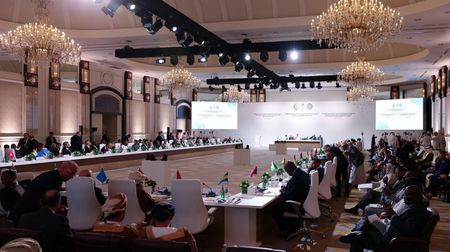By Alexandra Schwarz-Goerlich and John O’Donnell
VIENNA (Reuters) -Austria’s Raiffeisen Bank International increased its profit in Russia in the first quarter, driven by a stronger rouble, results showed on Tuesday as the most important Western bank in the country said it was paring back its business.
Last year, RBI came under intense pressure from the United States as well as European regulators to pare its ties to Russia, something it is now doing.
The lender recorded profit before tax of 575 million euros ($651 million), up more than a quarter compared with a year earlier, as Russia’s high interest rates boosted interest earned on billions stored at the central bank.
Raiffeisen had 10.7 billion euros of Russian deposits and loans of 4.9 billion euros, a rise on the end of last year but down from a year earlier, numbers the bank also said were skewed by a stronger rouble.
During the year from March 2024 to March 2025, the rouble rose about 12% against the euro, according to LSEG data.
Raiffeisen has been collecting several billions of euros in profits in Russia, handling valuable international money transfers and earning high interest on deposits, while paying customers little.
“We keep working on a sale of our Russian subsidiary and are talking to several interested parties,” said Chief Executive Johann Strobl, reiterating a message delivered repeatedly during the more than three years since Russia’s invasion of Ukraine.
“It remains to be seen whether geopolitical developments will facilitate the exit from Russia,” he added.
Should Western sanctions on Russia be scrapped as part of a peace deal for Ukraine, Raiffeisen could potentially unlock the billions now stranded in Russia.
COURT DISPUTE
The perils of doing business with Russia were evident, when Raiffeisen outlined that Russia’s central bank had taken almost 1.9 billion euros from the lender to settle a court dispute in Russia.
Raiffeisen said it hoped to soon launch an attempt to recover that money lost with a claim on a related stake in Austrian builder Strabag.
Earlier this year, a Russian court awarded more than 2 billion euros of damages against RBI in a dispute that erupted after an unsuccessful attempt to unlock some of the bank’s frozen billions in Russia.
The case centred on a claim by Russian investment company Rasperia against builder Strabag, its Austrian shareholders and the Russian arm of Raiffeisen.
Overall, RBI’s group profit after tax fell 10.7% to 318 million euros in the first quarter, due in part to higher provisions for loan defaults and larger costs, including for staff.
RBI, owned by a powerful Austrian industrial, agricultural and banking network, has roughly 18 million customers from Budapest to Moscow and more than 42,000 staff. It is a financial anchor for Austria and much of eastern Europe.
It has repeatedly said it wanted to spin off its Russian business, although it made little progress on this front.
While many Western governments have shunned Russia, some Austrian politicians had long been reluctant to sever ties with a country still thanked for allowing Austria’s rehabilitation in 1955 following World War Two. In return, Austria committed to remain neutral.
($1 = 0.8839 euros)
(Additional reporting by Samuel Indyk and Alex Marrow in London; Editing by Emelia Sithole-Matarise)











